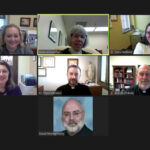By Bishop Thomas Zinkula
For The Catholic Messenger
I have been haunted by a story a parent shared with the diocese’s Gender Committee a couple of months ago of a child who was told by the pastor how the youth had to dress at the confirmation Mass. Even after complying, the pastor didn’t allow the youth to receive Communion. The next Sunday the pastor preached that LGBTQ+ people will go to hell. On Monday, the young person attempted suicide. This type of thing should never ever happen.

Experiences like this one were part of the reason for the formation of the committee and for the recent series in The Catholic Messenger, “A Pastoral Approach to Gender.” Most of the feedback has been positive, but some of the commentary has not been. I would like to address this directly.
A few people consider it an imprudent use of time and space to address something that affects only a small minority of the population. It is true that the percentage of people experiencing gender dysphoria is small, but does that mean we don’t need to minister to them? Jesus told a parable about the good shepherd leaving the 99 to go in search of the 1 lost sheep. We are obliged to seek out and minister to LGBTQ+ persons who are so often misunderstood and even vilified.
Others think that taking a pastoral approach to questions around gender is an approval of actions that violate Church teaching. I can assure you that the committee has no such hidden motives or agenda. The committee clearly stated at the outset that it was considering this matter within the context of Church teaching on human sexuality.
For example, we can simultaneously affirm Church teaching while sharing the concrete experience of one couple’s story of living with the tension of embracing their Catholic faith and accompanying their eldest child through a critical life challenge. Telling their story was a way to put a human face on the issue.
This is critically important. The committee discovered that 52% of all transgender and nonbinary young people in the U.S. seriously contemplated killing themselves in 2020. The suicide rate for transgender people is nearly 10 times the national rate. More than half think it would be better to be dead, rather than to try to live with rejection, isolation, loneliness and bullying.
In the committee’s numerous conversations with transgender persons and their family members over the past several months, none of them asked or expected the Church to change what she teaches. But they longed for a Church that welcomed and accepted transgender people as children of God. That is all they wanted.
Do we not want this for everyone? As one respondent observed, “Better for the Church to listen to the experience of transgender people. Before the Church can teach, it must listen.” In essence, the committee has been involved in a process of synodality: walking together with and listening to a population that is so often marginalized.
Finally, some people are nervous about putting this issue on the table due to a lack of familiarity with the topic. If the Church puts her head in the sand, closes her eyes, hopes this matter will simply go away and doesn’t say anything about it, she would be making a huge statement to people experiencing gender dysphoria and those who love them. The silence would be deafening. Basically, the Church would be saying that she doesn’t see you, hear you or care about you.
It is important to get to know people who experience gender dysphoria before jumping to conclusions. Our Christian faith calls us to love people. We cannot love them in the abstract. Love begins with personal encounter, with hearing someone’s story. Having a transgender acquaintance, friend, son, daughter, brother or sister guides the heart and gives one a more informed perspective on the topic.
The work of the committee is not about undermining Church teaching. It is about engaging a group of people who are on the margins, listening to them, accepting them as persons, accompanying them, loving them. That is the starting point to everything the Church does.
(Editor’s Note: This is a third article in a series on A Pastoral Approach to Gender.)












Bishop Zinkula …thank you for sharing this important view of this unfortunate position so many are in. Be it from the homosexual‘s painful life or the stance of the Catholic Church. The bottom line is we are called to love. No other needs more love than our brothers and sisters that are affected by this gender issue. I personally see it as they were mostly created this way. The body and the hormones got mixed up. They were born that way. Do we criticize others born with other abnormalities? No. We embrace them and love them through it. Do I believe that they should be married in the church? No, because God speaks of it in the Bible. But that doesn’t mean we don’t love them. God bless the ppl that they all could see them as important as you and me.
Sandy Good
Straight wife/mom